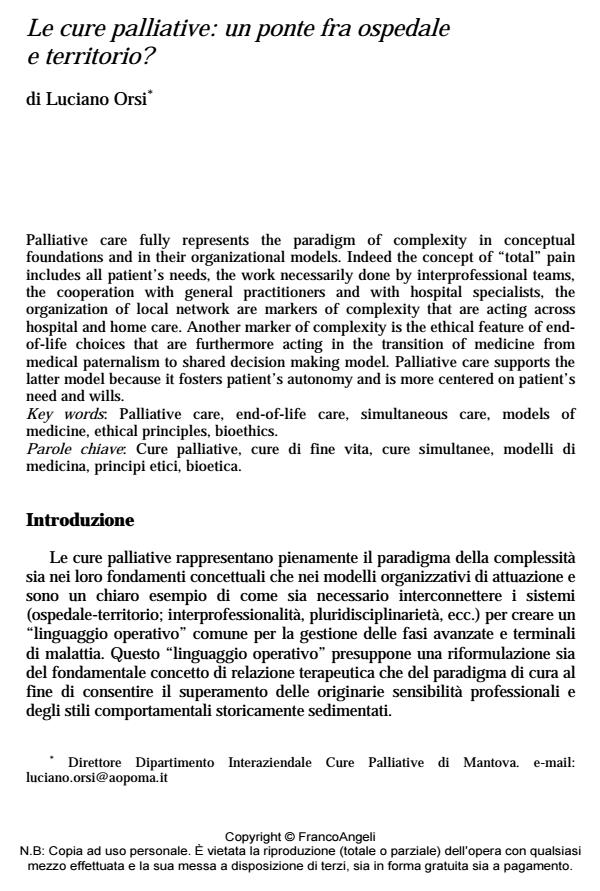Le cure palliative: un ponte fra ospedale e territorio?
Journal title SALUTE E SOCIETÀ
Author/s Luciano Orsi
Publishing Year 2015 Issue 2015/3
Language Italian Pages 12 P. 147-158 File size 70 KB
DOI 10.3280/SES2015-003012
DOI is like a bar code for intellectual property: to have more infomation
click here
Below, you can see the article first page
If you want to buy this article in PDF format, you can do it, following the instructions to buy download credits

FrancoAngeli is member of Publishers International Linking Association, Inc (PILA), a not-for-profit association which run the CrossRef service enabling links to and from online scholarly content.
Palliative care fully represents the paradigm of complexity in conceptual foundations and in their organizational models. Indeed the concept of "total" pain includes all patient’s needs, the work necessarily done by interprofessional teams, the cooperation with general practitioners and with hospital specialists, the organization of local network are markers of complexity that are acting across hospital and home care. Another marker of complexity is the ethical feature of endof- life choices that are furthermore acting in the transition of medicine from medical paternalism to shared decision making model. Palliative care supports the latter model because it fosters patient’s autonomy and is more centered on patient’s need and wills.
Keywords: Palliative care, end-of-life care, simultaneous care, models of medicine, ethical principles, bioethics.
- Alakson R., Randall C.J., Nelson J.E. (2014). The changing role of palliative care in the ICU. Crit Care Med, 42: 2418–2428
- ASCO Advanced cancer care planning (2011). What Patients and Families Need to Know About Their Choices When Facing Serious Illness. Cancer.Net
- Atto di Intesa del 25 luglio 2012- repertorio atti n. 151 - Conferenza Stato-Regioni Definizione requisiti minimi e modalità organizzative per accreditamento delle strutture di assistenza ai malati in fase terminale e delle unità di cure palliative e terapia del dolore.
- Beauchamp T.L., Childress J.F. (1994). Principles of Biomedical Ethics 4th ed. Oxford University Press
- Borsellino P. (2009). Bioetica tra morali e diritto. Milano: Cortina Raffaello
- Council of Europe (2003). Raccomandazione REC (2003) 24 del Comitato ministeriale agli Stati membri sull’organizzazione delle cure palliative. (Adottata dal Comitato ministeriale il 12 Novembre 2003 all’860esima Assemblea dei Deputati Ministeriali).
- Council of Europe (2014). Guide on the decision-making process regarding medical treatment in end-of-life situations. DOI: 10.1097/CCM.000000000000057
- Gristina G.R, Orsi L., Carlucci A., Causarano I.R., Formica M., Romanò M., per il Gruppo di Lavoro Insufficienze Croniche d’Organo (2014). PARTE II: evidenze scientifiche nelle insufficienze croniche d’organo “end-stage”. Documento di consenso per una pianificazione condivisa delle scelte di cura.
- Recenti Prog Med, 105(1): 25-39.
- Gristina G.R., Orsi L., Carlucci A., Causarano I.R., Formica M., Romanò M. per il Gruppo di Lavoro Insufficienze Croniche d’Organo (2014). PARTE I: il percorso clinico e assistenziale nelle insufficienze croniche d’organo “endstage”. Documento di consenso per una pianificazione condivisa delle scelte di cura. Recenti Prog Med, 105(1): 9-24
- Gruppo di Studio Bioetica SIAARTI (2006). End-of-life care and the intensivist: Italian Society of Anaesthesia Analgesia and Intensive Care Medicine (SIAARTI) Recommendations on the Management of the Dying Patient. Minerva Anestesiol, 72: 927-63
- Integral Kanzercentrum Nederland Agora (2013). Spiritual care guideline working group.
- Mori M. (2010). Manuale di bioetica. Firenze: Le Lettere Parlamento Italiano Legge n. 38 del 15 marzo 2010 “Disposizioni per garantire l’accesso alle cure palliative e alla terapia del dolore”.
- Pellegrino E.D., Thomasma D.C. (1993). For the Patient’s Good. Oxford Univ. Press
- Saunders C. (2008). Vegliate con me. Bologna: EDB: 9
- Veatch R. (1991). The Patient-Physician Relation. Bloomington and Indianapolis: Indiana University Press: 14-38
Luciano Orsi, Le cure palliative: un ponte fra ospedale e territorio? in "SALUTE E SOCIETÀ" 3/2015, pp 147-158, DOI: 10.3280/SES2015-003012